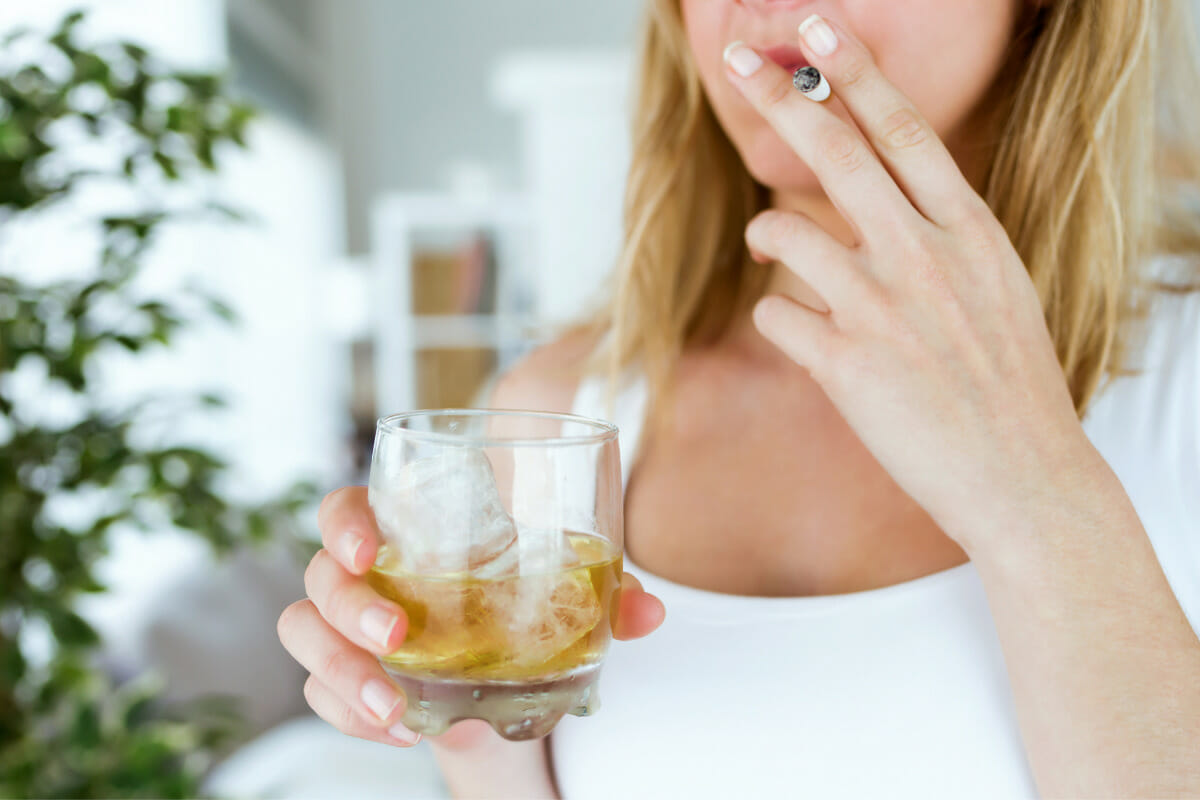National surveys have shown increased alcohol use and marijuana use during the COVID-19 pandemic. At the beginning of the pandemic lockdowns, people were unsure how long stay-at-home orders would remain in place. So, in March and April 2020, they stocked up on the necessities they felt would tide them over until they could safely leave the house again. Feeling fearful and uneasy about the many unknowns surrounding the novel coronavirus, many included alcohol and marijuana in their list of must-haves. 1,2
But alcohol and marijuana sales continued to trend upward post-lockdown3, and in 2021, alcohol sales are expected to increase even more than they did in 2020.4 The cannabis industry isn’t slowing down either. Sales of legal marijuana are predicted to grow from nearly $19 billion in 2020 to almost $42 billion in 2026. 5
Individuals who have increased their alcohol or marijuana consumption over the past eighteen months could be at risk if they continue to rely on these substances to help them cope with stress.
Increased Alcohol Use, Marijuana Use Coincided With Easier Purchasing
Even though many bars and restaurants closed their doors to indoor dining during the early part of the pandemic, these same establishments were allowed to provide take-out service or delivery of alcoholic beverages. And as e-commerce surged as a result of closed brick-and-mortar stores, alcohol was just another product that was easy to purchase online.
Although there are fewer options for purchasing legal marijuana, dispensaries in 28 U.S. states or territories remained open during lockdowns because medical marijuana use was deemed essential during the pandemic.6
As alcohol and marijuana became easier to access, doctors and counselors were worried about how increased availability would impact those already struggling with a substance use disorder. It may be some time before we can get a complete picture of the impact of increased use of alcohol and marijuana during pandemic closures and in the months that followed. However, scientists and policymakers have offered insights into the lasting impact of alcohol and marijuana use during the pandemic.
Effects of Increased Substance Use During COVID-19 Pandemic
As reports about increased alcohol use and spending during the pandemic began to surface, researchers sought to understand the specific effects of increased alcohol consumption during the COVID-19 pandemic. Their findings emphasize that the COVID-19 pandemic intensified the problems typically caused by excessive alcohol use.
Expected Increase In Alcohol-Related Liver Disease (ALD)
One recent study used a modeling technique to determine how greater alcohol use during the pandemic may contribute to an individual developing alcohol-related liver disease. The study proposed that even a short-term increase in alcohol use could impact ALD morbidity. The model compared drinking patterns during COVID-19 to similar drinking patterns before the pandemic. The scientific model estimates the following increases between 2020 and 2040:7
- 2% increase in acute cirrhosis (17,000 additional cases)
- 1% increase in liver cancer (1,100 additional cases)
- 1% increase in ALD deaths (8,200 additional deaths)
The study also made some short-term predictions, stating that an additional 2,200 cases of acute cirrhosis and 100 additional deaths are likely between 2020 and 2023.
Damaging Effect On The Immune System
Consuming 40g or more of pure ethanol alcohol per day (the equivalent of four drinks) can cause significant damage to the immune system:8
- Reduces the number of T cells
- Increases the level of pro-inflammatory cytokines, including the IL-6 cytokine whose “storms” may cause harm in COVID-19 patients
- Decrease in the number and function of healthy cells that remove infected cells
Greater alcohol use can make an individual less likely to fight respiratory infections like HIV, pneumonia, and COVID-19.8
Heavy Drinking By Those With Mental Health Disorders Could Increase Likelihood Of Developing Addiction
Results of online surveys administered during March and April 2020 concluded that people who suffer from anxiety or depression had a greater likelihood to drink a greater volume of alcohol than those without mental health issues:9
- Anxiety-sufferers were 41% more likely to increase their alcohol consumption
- Those with depression were 64% more likely to drink more alcohol
Mental illness causes changes in brain activity that can alter the way people respond to substances like alcohol or drugs. They may experience enhanced rewards (feelings of pleasure) from using these substances, become less aware of their adverse effects, and continue to use them to “treat” the unpleasant symptoms of their illness. Those behaviors may increase the possibility of becoming addicted to the substance.10
Uptick In Alcohol Use During Lockdowns May Have Increased The Likelihood Of Domestic Violence
After reviewing the data from several U.S. cities, the National Commission on COVID-19 and Criminal Justice found that domestic violence incidents increased 8.1% following pandemic lockdowns.11
Stay-at-home orders made women more vulnerable to domestic abuse by their partners. Women had to stay at home near their abusive partners, and stress from possible financial instability made existing conflicts worse. Plus, when the abuser drinks alcohol, it typically increases the probability that violence will occur.12
More Alcohol Use May Impact Economic And Societal Costs
Increasing the amount of alcohol use exacts costs on communities as well as individuals. Populations may experience:13
- Lower Life Expectancy – Injuries and diseases associated with excessive alcohol consumption cut life expectancy
- Higher Health Spending – More alcohol use requires more resources to treat alcohol-related illnesses, such as liver disease, cancer, cardiovascular disease, and alcohol-related injuries.
- Poor Educational Outcomes – Students who drink alcohol at harmful levels will exhibit poorer educational performance. A decline in educational outcomes can impact the economic growth and social welfare of a population.
- Decreased Opportunities for Employment and Work Productivity – People with alcohol-related illnesses are more likely to be unemployed or show poor work performance. In communities where alcohol abuse is increasing, absenteeism can hurt labor productivity.
Overall, the problems associated with more alcohol use could lower the GDP by 1.6% on average.13
Effects Of Greater Marijuana Use During Pandemic
There has been less attention on greater marijuana use during the pandemic. However, here are a few highlights from existing research:
- A growing body of evidence suggests the THC from marijuana can suppress the immune system and make those who use it more susceptible to a worse outcome if they’re infected with the COVID-19 virus.14
- Because those with mental health disorders were most likely to use medical marijuana during the pandemic – and since it was reported that those with mental health conditions increased their medical cannabis use by 91% – these users may be in danger of developing marijuana use disorder.2
- People diagnosed with anxiety or depression were most likely to report increased use of marijuana during the pandemic.2
- Those who develop a marijuana use disorder are at risk of developing other mental disorders.15
- Studies have shown marijuana use leads to an increased risk of developing depression and bipolar disorder.16
- Both animal research and human studies have found that marijuana exposure during developmental periods can damage brain function. Fortunately, marijuana use among adolescents did not increase during the pandemic.17 This is likely due to many teenagers having to stay at home with their parents, reducing access to drugs.
Did You Develop Unhealthy Substance Habits During The Pandemic? Silver Sands Recovery Can Get You Back on Track.
It’s understandable why someone would feel scared, unsettled, unhappy, or bored during last year’s pandemic closures. However, if you’ve relied on alcohol or marijuana to cope, you may have developed unhealthy habits with either substance.
During the pandemic, each person experienced life differently. And if you’re worried that you may have developed a substance use disorder while in lockdown or in the months that followed, you shouldn’t settle for anything other than a treatment program that’s customized just for you. At Silver Sands Recovery, we take a holistic approach to help you discover why you’re feeling stuck in life.
Our program will help you uncover the reasons why you turned to alcohol or drugs in the first place, and we’ll provide the tools and lessons that will allow you to rebuild your life. Call us 24/7 or contact us online for help.
Sources:
[1] https://www.rand.org/news/press/2020/09/29.html
[2] https://www.tandfonline.com/doi/full/10.1080/10550887.2020.1811455
[3] https://www.theiwsr.com/us-total-beverage-alcohol-consumption-in-2020-was-the-largest-volume-gain-in-nearly-20-years/
[4] https://www.thedrinksbusiness.com/2021/06/alcohol-consumption-in-us-up-to-highest-levels-since-2002/
[5] https://www.statista.com/statistics/933384/legal-cannabis-sales-forecast-us/
[6] https://mjbizdaily.com/states-that-have-allowed-marijuana-businesses-to-remain-open-during-coronavirus-pandemic/
[7] https://www.medrxiv.org/content/10.1101/2021.03.18.21253887v1.full-text
[8] https://www.sciencedirect.com/science/article/pii/S2214750021000469#bib0305
[9] https://www.sciencedirect.com/science/article/abs/pii/S0091743521000062?via%3Dihub
[10] https://www.drugabuse.gov/publications/research-reports/common-comorbidities-substance-use-disorders/why-there-comorbidity-between-substance-use-disorders-mental-illnesses
[11] https://covid19.counciloncj.org/2021/02/23/impact-report-covid-19-and-domestic-violence-trends/
[12] https://www.who.int/violence_injury_prevention/violence/world_report/factsheets/fs_intimate.pdf
[13] https://www.oecd.org/coronavirus/policy-responses/the-effect-of-covid-19-on-alcohol-consumption-and-policy-responses-to-prevent-harmful-alcohol-consumption-53890024/
[14] https://www.ccsa.ca/sites/default/files/2020-04/CCSA-COVID-19-Cannabis-Smoking-and-Vaping-Report-2020-en_0.pdf
[15] https://www.nih.gov/news-events/news-releases/marijuana-use-disorder-common-often-untreated
[16] https://www.ncbi.nlm.nih.gov/pmc/articles/PMC6397076/
[17] https://www.nih.gov/news-events/news-releases/adolescent-marijuana-alcohol-use-held-steady-during-covid-19-pandemic


